Top ten most influential: Books
Nov. 9th, 2015 01:34 pmSome of these set my artistic tone or left huge imprints on my personality, others changed the course of my life or career. With each item I can say, "if not for this, I would be someone else right now." But why? It's a surprisingly hard question to answer. A strong feeling would compel me to put something on the list, and then I'd realize I had no clue how to unpack that feeling.
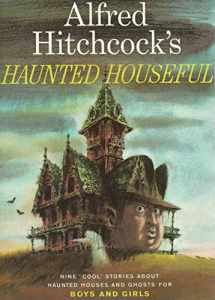
(Age 11) - Alfred Hitchcock's Haunted Houseful
I already liked Halloween. I even had some creepy coloring books. But I wasn't all that into reading, until I found this book in hardback in the school library, and instantly adored it. It had way more words than pictures but the stories were pitched right at my grade level, and most importantly, the illustrations that accompanied them were very creepy indeed. Look at that shadowy old lady with the grasping hands! I've gotta read the words to find out what she's up to...
The illustrations were in rough-hewn ink, like they were made of cobwebs and dust, with deep shadows and big lurid splashes of primary color. I read the stories over and over and imagined myself walking around in the illustrations. I still sometimes walk around them in my dreams, a quarter-century later. This book led me directly to the "Three Investigators" series, then to Poe and Lovecraft, and then to Stephen King's anthologies, and then his longer stuff. I quickly moved from books that were mostly drawings, to books that were all words. I was a sensitive kid, and I found I could grapple with my overactive sense of fear by engaging with it in fiction.
From the introduction in the book:
"This book is an effort to provide reading for young people who are at the awkward age. Children who are too lazy to walk but still too young to drive. I have previously edited two books for the "older set" and the poor dears were frightened silly!"
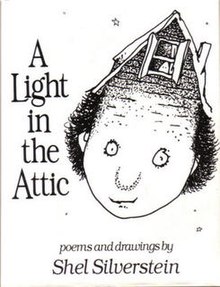
(Age 12) - Shel Silverstein - A Light In The Attic
Just look at the illustration on the cover of this book. The guy's own head is a house with some little tiny ... thing ... peeping out. As a kid, the symbolism was totally lost on me. The most I ever thought about it was: "Hey look, it's a guy with a house for a head. That's funny! What a funny book."
Like the Alfred Hitchcock book, it was the illustrations that reeled me in. The characters were weird and ugly, and they all had grit in their joints and dots all over their naked butts. A realm where no one was pretty and nothing was clean felt oddly reassuring to me. Then I started reading the absurd, playful rhymes, and a universe of poetry opened up. I read them out loud to myself, and had a kind of epiphany that poetry was ten times better when it was performed out loud.
Over the years my appreciation for poetry deepened and I began memorizing some of my favorites and busting them out randomly. Ask any of my friends - I'm a poetry menace, just waiting to hold forth. It all started with Shel Silverstein.
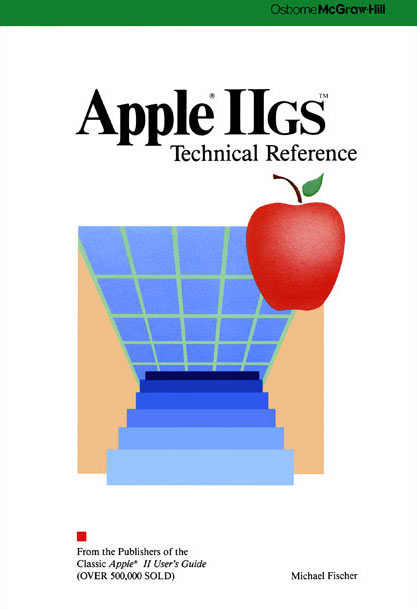
(Age 14) - Michael Fischer - The Apple IIgs Technical Reference
This dog-eared and stained book was my gateway to making our fancy 16-bit home computer do awesome things. It was also the first piece of real reference material that I thoroughly used for my own purposes. It was not like a dictionary, or an encyclopedia - it was a loosely-organized information dump, bursting with charts and tables. You could go hunting in it for inspiration, as much as for answers to specific questions.
Some of the charts referred to areas of the Apple IIgs hardware that were set aside for future development - blank regions in the computer's guts that you weren't supposed to consider permanent, or usable. Some of these were marked "reserved, must be zero" and others were marked "reserved, do not modify". My friend Alex and I decided that "reserved, do not modify" was code for "we're already using this for something but we don't want you to know what it is". Later in our decades-long computer careers we would throw those phrases around, to mock all the bad documentation we came across.
After all these years, mostly thanks to the internet, this remains THE ONLY reference book I have ever purchased!
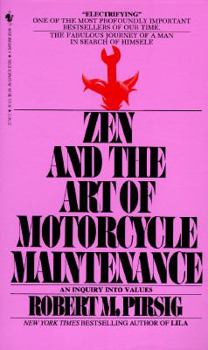
(Age 15) - Robert M. Pirsig - Zen And The Art Of Motorcycle Maintenance
I found this on the spinny paperback carousel in the school library and read it a piece at a time. All I remember of the plot is a guy traveling on a motorcycle, philosophizing to himself as he goes. It wasn't the plot that was interesting to me anyway - it was the philosophical asides, including an obsessive examination of the concept of "quality" and what it means to design for it, and live it.
In my 15-year-old's environment of school and pop-culture media, no one around me was raising questions about practical philosophy, let alone trying to answer them. All I'd been given were vague platitudes about sportsmanship and civic pride, and the occasional loopy sermon about the mystery of God. This book opened my mind, and also dropped a starter-kit of tools inside just as I was reaching for them.
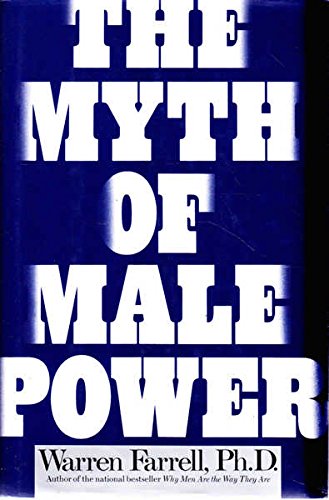
(Age 17) - Dr. Warren Farrell - The Myth Of Male Power
I grew up a few minutes outside of Santa Cruz, California in the 80's and 90's. A very progressive youth movement was in effect, working in opposition to the rich, sexist, and exploitative "baby boomer" adults who seemed to control everything around us, from popular media to civic planning. It seemed like everyone my age was talking about how necessary the women's movement was, how hard women had it, how narrowly defined women's roles were, and how corrupt and backward the all-consuming patriarchy was. I had taken my fair share of bullying from young men around me, and was happy to participate in a movement that placed their ultra-macho behavior in the trash. I could relate more often to women than to other men.
At the same time, the only dialogue I heard about men's issues was shrill and reactionary. The only contrary voices to the women's movement were men defensively picking on women, and stereotyping women, to deflect attention away from their rising identity as oppressors. I found it repellant. Women clearly needed more respect and opportunity. What right did men have to complain about their position?
Then I found this book in the library. It was a way of thinking about male privilege that stood everything on its head. It not only exposed the ways in which men were conditioned to devalue themselves, but the ways in which manhood itself was flawed, even dangerous, for men and women alike, and it did so without placing any blame on women. It was not defensive or reactionary, and it made sure all of its points were backed with references and statistics. It absolutely blew my mind. How could I have been so ignorant of these ideas, for so long?
This book rearranged my whole outlook on gender politics and the definition of manhood, in a few short months. I sang its praises to my friends - to the point where it began to bug them. A couple times I read paragraphs out loud from it when we were hanging out at the local Denny's, because I thought everyone needed to hear it. I'm pretty embarrassed by that now! Hopefully nobody remembers that but me...
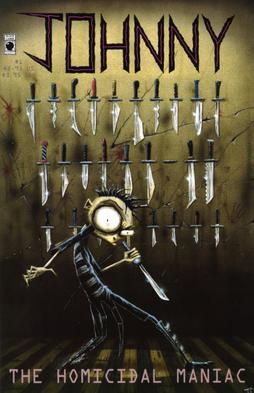
(Age 19) - Jhonen Vasquez - Johnny The Homicidal Maniac / Squee
My group of friends crossed partially over into the local "goth scene". You know - that scene where it was de rigueur to wear lots of black clothing with occasional neon and pinstripes, and talk about death, depression, isolation, the occult, pagan and wiccan spirituality, smoke and drink, avoid exercise, listen to dour, serious music, and hate the establishment. No, not the beatniks -- after that. No, not 'emo' either -- before that, and way before Twilight. Yeah, goth. That's the one. Think, "punk but depressed."
Those are stereotypes of a scene of course. In practice, I had friends who were drawn to some idea or fashion that fit under the stereotype, but disliked some or all of the rest of it. That's what made it a scene rather than a clone army: It varied. It was in transition. My point is, there was plenty of reason for people to mock and deride parts of the very scene they were supposedly in. Yes - bitching about the scene was, itself, part of the scene!
Jhonen Vasquez's comics mixed phythonesque absurdist humor, cartoon violence, creepy images, and the occasional dramatic monologue, to explore the antagonistic relationship that the scene had with the culture at large - and with itself. Why declare something "dark" and "goth", when you could go all the way and call it "dark dank danky dark gothy doomy-doom doom"? If you've always thought vampire fangs were attractive, what would it be like if they kept growing and you ended up with 10-foot-long walrus tusks instead? What if, to keep your depression in check, you had to actually kill all your friends and family - and everyone else who got close - then drain their blood and paint it onto a wall, instead of just writing about it in your diary and listening to angsty music? Jhonen always lampooned from a place of affection, compelling the scene to embrace its contradictions, like an extended family embracing its less functional but more colorful members.
He also highlighted the connection between depressive self-seriousness, and manic insanity. Something all of my friends had in common was a tendency to leap between these two, and we borrowed plenty of catchphrases and images from Jhonen's art over the years.
AIIIGH! BEES!
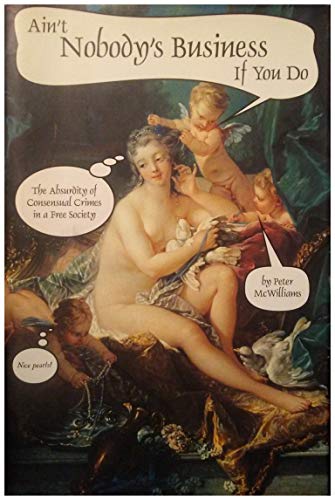
(Age 20) - Peter McWilliams - Ain’t Nobody’s Business If You Do
This is a thick book that makes many cases for one common theme: Government should not try to punish victimless crimes.
But it's not just that - it's a kind of grand tour through the author's mind, introducing you to all the ideas and experiences that shaped his attitude, and motivated him to focus on victimless crimes as an important cause. That grand tour provides plenty of context, inspiration, and amusement, making the book a pleasure to read - much more fun than a dry point-by-point thesis would have been.
I wasn't looking for a book like this - I don't even think I knew the definition of a "victimless crime" beforehand - but a friend dropped it into my lap and said, "this is your kind of book," and he was right. I still remember the way Peter started the section on religion by quoting the First Amendment, like so:
"Amendment I: Congress shall make no law ... wait, let me emphasize that. Congress shall make NO LAW ... No, that's still not the right emphasis, let me try that again. Congress shall make
[these two words, in huge type, sprawled across two entire pages of the book]
... respecting an establishment of religion, or prohibiting the free exercise thereof; or abridging the freedom of speech, or of the press; or the right of the people peaceably to assemble, and to petition the government for a redress of grievances."
After this book I had a new perspective on victimless crimes, thoroughly entrenched in my mind, with context and examples to boot. I also learned that it was possible to write long-form non-fiction with a playful, conversational style, and I decided I would pursue that in my own (amateur) writing.
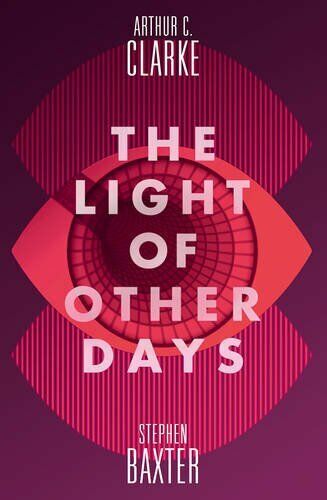
(Age 31) - Arthur C. Clarke and Stephen Baxter - The Light of Other Days
Good science fiction is often about exploring the impact of a near-future technology on human society. In this case, it's a technology that allows a user to see and hear what happened anywhere in the past - from moments ago to eons ago. As the technology is refined and mass-produced, it steadily eliminates all privacy from society. Absolutely no place is safe from observation, and no act, no matter how evil or embarrassing, can be blocked or removed from the record of history.
This book resonated with me because it makes a key assumption: That everything we do is etched permanently into the past; it's just a matter of accessing it. To a person with a life-long habit of autobiography, this is simultaneously a wonderful thing and a terrible thing. Wonderful because it means that no history is truly lost, even if it isn't observed at the time. Terrible because, well, if it's already recorded with perfect fidelity, why would anyone bother to write about it? What a waste! Better to ditch biography, trash all of my notes and stories, and focus only on the future.
But then, take it a step further: Imagine that the past is recorded, and we can all effortlessly read the recording too. All our friends and descendants can learn all our secrets, free of any spin, editing, or damage control we may wish to apply. They can take the measure of us completely. Perhaps in the near future, someone will look up my own record and see the messy, selfish, entitled role I feel that I've played for most of my life. Inevitably they will ask, "Why didn't he do more? Why was he so content to read and ride his bike and mix music and eat, for so much of his time?" And most damning, "Why didn't he see that the deceptions he made caused far more damage than they were worth?"
Deceiving people seems like such a waste of time, when all your sins are public record. Forget judgement from a mysterious divine being. The judgement of your peers, of your own society, of those you could have left a better planet to - of anyone and everyone for the rest of time - that's a heavy weight indeed. How do you stay sane with this burden? The only way is to rely on deception as little as possible - and to accept that everyone is deeply flawed - yourself included - and what matters is the present, because it is when the pen of history is in your hands alone and you get to write with it.
Since I read this book, the idea has become periodic, like a comet wheeling in and out of the solar system of my thoughts. I'll stop sometimes and think, "Wow, what I'm doing right now is part of permanent history. Don't I have something better to do?" Or sometimes, it's, "Even if a million eyes from the future are staring at me and shaking their heads over this moment, well, screw them, because I feel like goofing off. They should be doing something better with their own lives than frittering them away as voyeurs to my boring self, anyway."
I think if this idea were any more than a periodic intruder, I would quickly go insane!
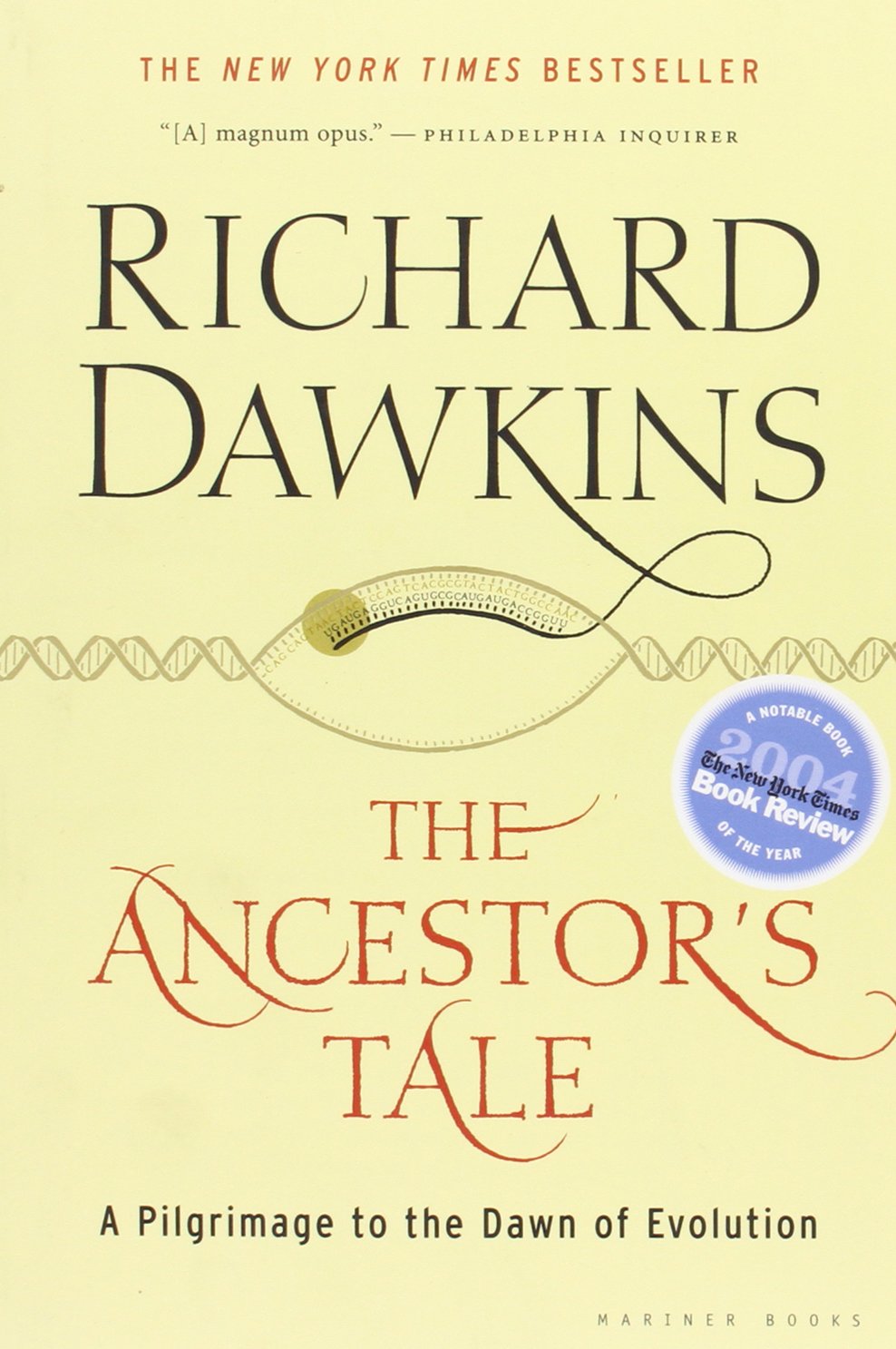
(Age 32) - Richard Dawkins - The Ancestor's Tale
I wrote a little blurb about this a few years ago. It's the book that really got me turned on to genetics and microbiology. It is not the most in-depth writing about either, but it presents an amazing parade of case studies for the power of evolutionary theory in explaining the why and the how of the natural world. It's incredibly awe-inspiring - more than any miraculous coincidence, more than any creation myth, more than any flowery poem about the majesty of the divine - to realize that a vast array of seemingly inexplicable things about our living world can be elegantly explained by the application of a single theory - and beneath that, on the biological level, how it arises from a mathematical extrapolation of basic physical laws.
Evidently some people feel that this kind of knowledge threatens their spirituality. I feel sorry for them. Evolution doesn't supplant spirituality or religion - it just tidily describes the mechanism that got us here, and one of the ways in which we are all connected. It actually gives spirituality excellent material to work with.
This book led to another, and another after that, and so on until I'd devoured a whole bookshelf, and moved on to textbooks and scientific journal papers. When a career change was necessary in 2011, this obsession pointed the way.
(Age 38) - Barbara Demick - Nothing to Envy: Ordinary Lives in North Korea
I believe this journal entry says everything I needed to say.
no subject
Date: 2016-03-31 06:02 pm (UTC)Robert M. Pirsig - Zen And The Art Of Motorcycle Maintenance
; '